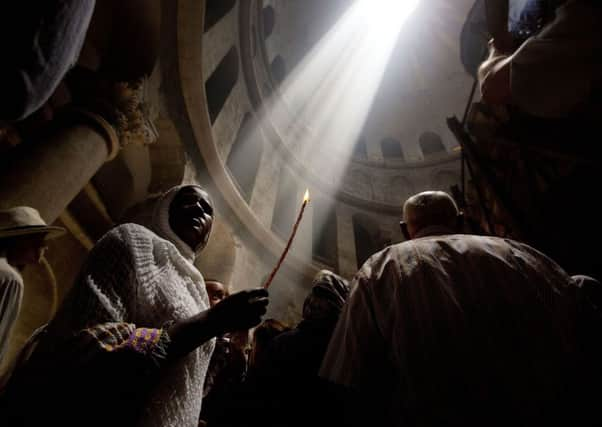If churches don’t resolve millennium-old dispute on an Easter date, governments may do it for us


It is in fact observed on the first Sunday after the first full moon on or after the northern vernal (Spring) equinox, which is known in ecclesiastical circles as the paschal full moon.
Perfectly reasonable? Yes and no, maybe. It is reasonable because it can be worked out, but perhaps unreasonable in the sense that every year we have to look up the date in a diary or table in order to make our plans.
Advertisement
Hide AdAdvertisement
Hide AdAs a consequence, Easter holidays are not always at the same time, which can be somewhat frustrating for schools, parents, businesses and governments.


So, why not just fix a date? This is precisely what Parliament did in the Easter Act of 1928, which declared that Easter would always be on the first Sunday after the second Saturday in April.
However, that law has not come into effect because it requires that regard be given to “any opinion officially expressed by any church or other Christian body”.
So, why doesn’t the church simply agree? The reason lies in the fact that there are different churches which mostly have links with other churches around the world, and they do not want all to be celebrating Easter at different times. All churches, everywhere, really need to agree.
Advertisement
Hide AdAdvertisement
Hide AdTo be precise, there are already different dates for Easter, and Christmas, as between the Orthodox and the western churches.
The Anglican Communion has further explained: “While the eastern church bases its calculations on the actual, astronomical full moon and the actual equinox as observed along the meridian of Jerusalem, the western church applies a fixed date of March 21st for the vernal equinox and uses ecclesiastical tables of new moons rather than actual astronomical full moons, resulting in different dates in the east and west despite the common formula.”
Getting all churches everywhere to agree is challenging to say the least. There already is this difference and it is not desirable that there should to be any more differences. In fact, it is most desirable that there should not even be one difference. All Christians should ideally be celebrating the major festivals of the Christian year at the same time.
The Christian world comprises many denominations. Look at the church services and announcements columns particularly in Northern Ireland newspapers and it is clear to see.
Advertisement
Hide AdAdvertisement
Hide AdIt was not always like this. At the beginning of the church, just over 2,000 years ago, there was the band of disciples who, very early on, were first called ‘Christians’ at Antioch, an ancient city that gave its name to modern-day Antakya in Turkey.
It is fair to say that the first church history is the Book of Acts, written by St Luke and of course now contained within the New Testament. It is in Acts that we are told about the title ‘Christians’ being first attached in Antioch to followers of Jesus.
Yet, there were to be differences of different sorts within the church, but two major breaks in Christian history were the split between East and West in 1054 and the Reformation roughly 500 years later, which was a division within the western part of the church.
There was an earlier division, in the mid-5th century, when the Oriental Orthodox in north Africa and parts of the Middle East broke from the rest of the church. The point at issue was the early accepted teaching that the earthly Jesus had two ‘natures’ (human and divine) while remaining one being.
Advertisement
Hide AdAdvertisement
Hide AdThe Oriental Orthodox held that there was one being with only one ‘nature’, but this ‘nature’ was both human and divine.
Splitting theological hairs? Well, the Oriental Orthodox position derives from a very real concern that the ‘two natures in one being’ concept could in fact be a slippery slope towards separating the divine and the human in Jesus so starkly as ultimately to result in ‘two beings in one body’, which was the Nestorian heresy.
It is indeed somewhat mind-boggling but, whatever one makes of this debate, the four Christian worlds – Oriental Orthodox, Eastern Orthodox, Roman Catholic and Protestant (of various shades) – generally enjoy peaceable relations even though theological points can be very hotly debated.
Several years ago, the leader of one of the Oriental Orthodox churches, the Coptic Orthodox Pope Tawadros II of Alexandria, proposed that the date of Easter be fixed on the second Sunday of April.
Advertisement
Hide AdAdvertisement
Hide AdYes, he has the title ‘Pope’. The Coptic Orthodox Church is in fact very ancient; according to the 3rd and 4th century church historian, Eusebius of Caesarea, it was founded by St Mark in either AD 41 or 43.
In 2016 the Primates of the Anglican Communion, of which the Church of Ireland is part, agreed to support Pope Tawadros in his call for a universally fixed date for Easter. Archbishop of Canterbury Justin Welby committed to pursuing the matter with him.
However, a spokesperson for Archbishop Welby told me for this column that there is no update on the matter “at the moment”.
It is said that when it comes to change there are three types of people: those who embrace it quickly and eagerly, those who initially are hesitant but usually come around to accepting it, and those who will never budge.
Advertisement
Hide AdAdvertisement
Hide AdOn the date of Easter at least, I suppose I fall into the second category. I quite like the quirkiness of the date of Easter being a somewhat unknown factor and of our being dependent on such esoteric things as the vernal equinox and the full moon in order to establish it.
Yet, I understand the convenience of having a fixed date – and it works for Christmas.
But what in the end makes me come down on the side of changing to a fixed date for Easter is the very real possibility that if the churches do not make the change, society will simply decree that there will be a Spring holiday with a fixed date, and any religious significance would quickly be lost.
When asked in 2016 about making the change, Archbishop Welby reportedly commented: “I think the first attempt to do this was in the 10th century so it may take a little while.”
Advertisement
Hide AdAdvertisement
Hide AdA cautionary if somewhat droll comment, but because of the quickening pace of secularization, making the change may actually be quite urgent.
• Canon Ian Ellis is a former editor of The Church of Ireland Gazette.